
In 2021, we’re all ready to get out of the house, but what’s the best way to do that? For a lot of families, the answer is getting an RV or motorhome. Owning an RV can be a great experience. RV ownership helps families bond with others, encourages adventure, and most importantly for this year, it can help you leave your home for several days or more.
Whether you’re just looking for a weekend getaway, or you’re seriously contemplating going off the grid for the rest of your life, there are several things you should know about RV ownership. For example, how much does an RV cost? What are the benefits and challenges of owning an RV? You’re looking for answers, so let’s take a closer look at what you need to know. The key to successful RV ownership is doing the right research.
Related: RV and Camper Brands | Where to Buy Used RVs | How Much RV Rent per Week | 2-Bedroom RVs | Online RV Stores
How Much Does an RV Cost?
First of all, let’s start with the biggest question: How much does an RV cost? Unfortunately, there’s no easy way to answer that question. Brand-new RVs can cost anywhere from $35,000 to $300,000 or more. The cost depends on the class of RV, the features, and several other factors. For instance, if you buy a small RV, you’ll pay a lot less for it than you would pay for a large one. If that small RV happens to be a used one, then you can save even more money.
Furthermore, when you look up the cost of owning an RV, you may also notice several other options that aren’t technically RVs but can still provide a great camping experience. If you consider these additional options, such as pop-up campers and travel trailers, you get an even wider possible price range. Some of these choices can cost less than $10,000, which is a big difference from the $300,000 you might expect to pay for a new luxury RV.
At the end of the day, you can’t answer “how much does an RV cost?” without doing a lot of research upfront. However, for many people, that research is absolutely worth the time and effort once they join the ranks of proud RV owners. When you take the time to research, you can make sure that you get the best RV or camper for your needs and desires.
Benefits of RV Ownership
So, what exactly makes RV ownership worth the cost and research effort? If you’re already asking yourself about the cost of buying an RV, then you’ve probably already explored at least some of these benefits. Still, let’s take a closer look at some of the biggest perks of RV ownership. Here are some of the biggest reasons why people purchase RVs.
Cost-Effectiveness
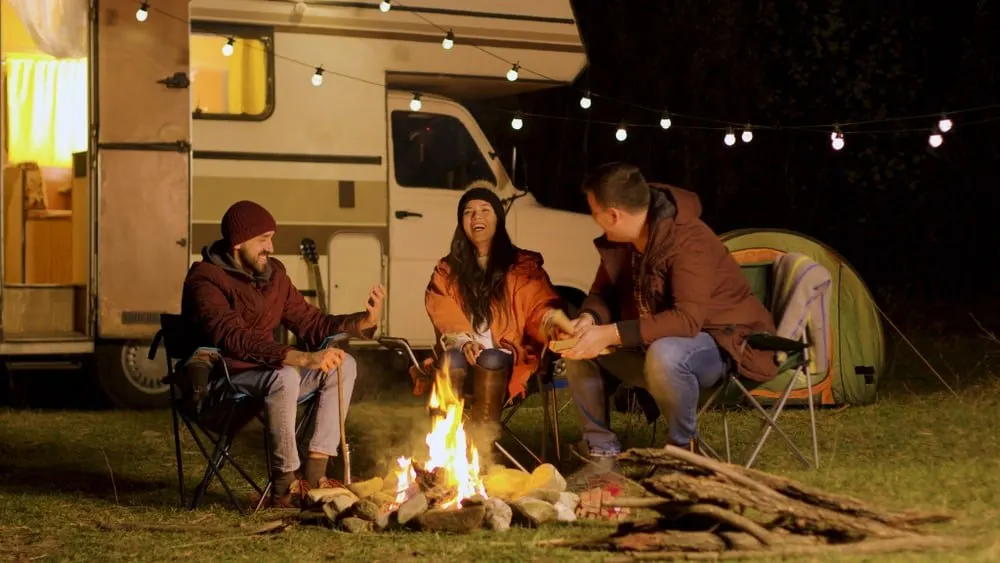
If you and your family do a lot of traveling, then owning an RV can save you a lot of money over time. Granted, RVs and motorhomes are far from cheap, as you’ve already seen from the examples above. They can cost a lot of money upfront. However, they can also be extremely cost-effective in the long run when you compare the cost of RV ownership to the cost of other types of travel.
For example, if you often travel by RV, then owning your own RV can cost less than renting an RV every time you and your family make a trip. However, even if you don’t generally rent an RV, owning one can still save you money. That’s because sleeping overnight in an RV is less expensive than sleeping in a hotel. At a hotel, you may have to pay for several rooms to accommodate everybody’s sleeping needs. At an RV park, however, you’d generally have to pay per vehicle rather than paying per person.
Driving an RV to your destination can also save you money on plane tickets and other travel expenses.
Finally, you can save money with RV living by buying groceries and eating at “home” instead of going out to eat for every meal. When you travel by car, plane, or other methods, you almost have to eat at restaurants if you want to keep yourself fed on the road. RVs, however, have plenty of space for food, snacks, and beverages. If you do decide to go to a restaurant, you can do so as a treat instead of as a necessity.
Minimalist Lifestyle
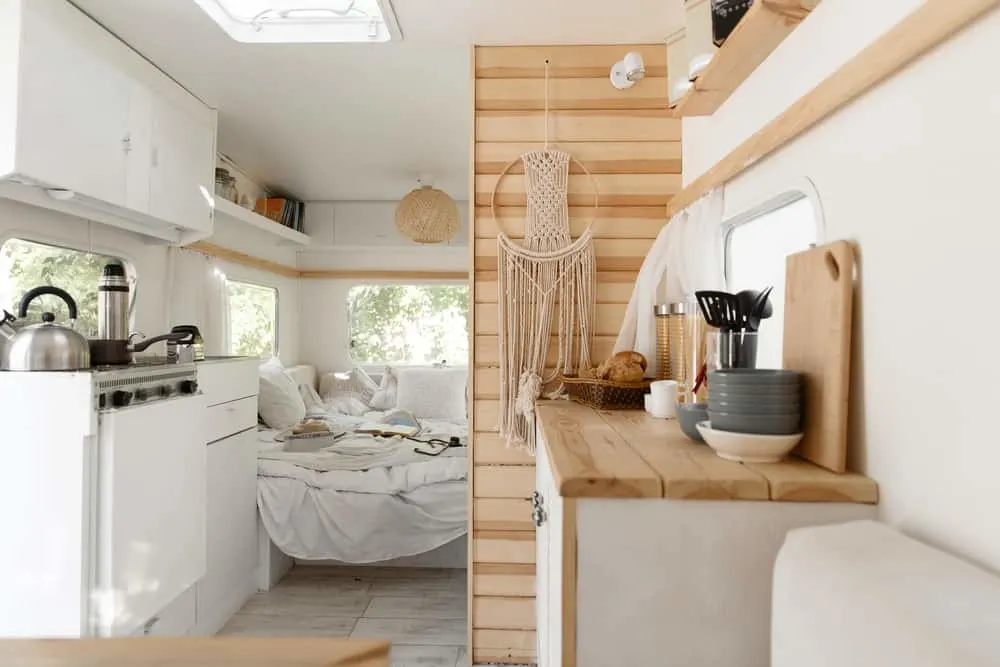
RVs and motorhomes appeal to a lot of people because of the minimalism. Even the largest RVs have limited space, so they force travelers to make decisions about what they really need on the road. Getting away from the day-to-day trappings of “real life” can be a very freeing, healing experience for a lot of people. Without all of life’s “extras,” families and friend groups can bond with each other in an RV and really get to know one another.
Always There When You Need It
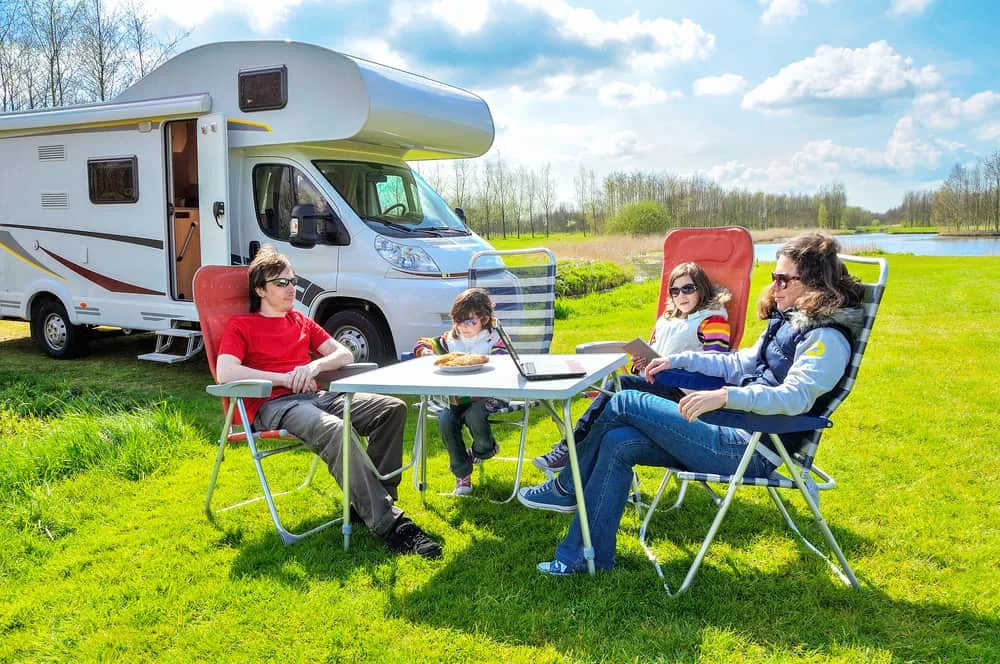
There are a lot of perks to renting an RV, but one of the biggest benefits of owning an RV is that you’ll know that your RV is always there when you need it. During certain seasons, rented RVs come in high demand, so they may be harder to find. With RV ownership, there’s no need to worry that you won’t find an RV to rent or that you’ll have to pay a large price due to supply and demand.
Outdoor Exploration
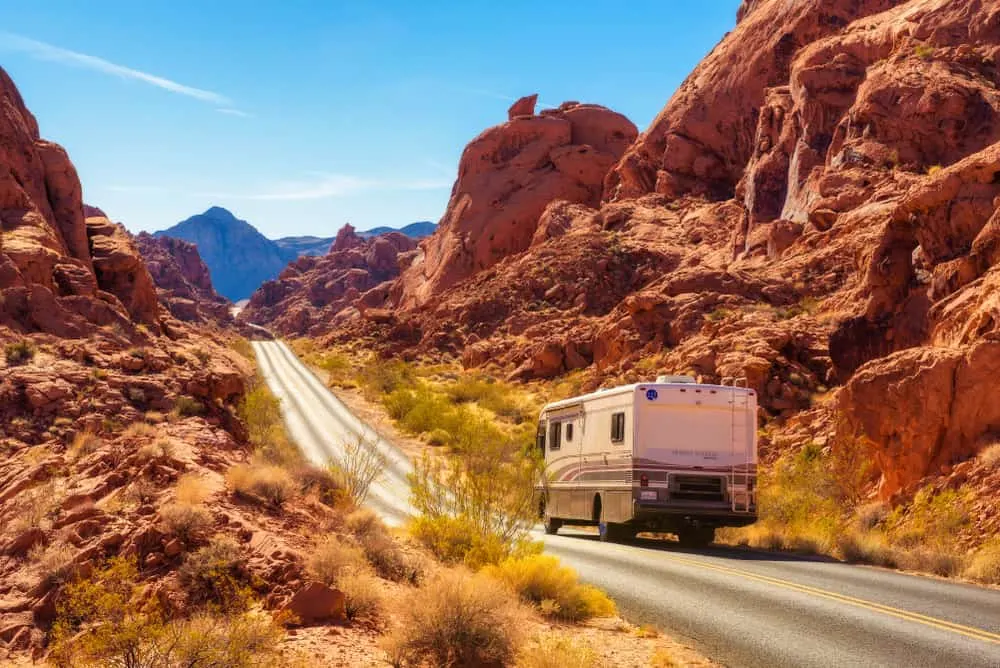
Finally, of course, RV ownership encourages outdoor exploration. Most of us spend way too much time indoors. On some days, the most time we spend outside is the time it takes for us to walk to our cars. Humans just weren’t built for this much indoor time, and RVs can help us get back to our outdoor roots.
Of course, many RVs come with luxuries and lots of space, but at the end of the day, RVs are for sleeping, cooking, and downtime. They provide a small amount of indoor space so that you can spend the rest of your time outside. Whether that means hiking, relaxing on the beach, or just reading a book in the sunlight, RV life means outdoor life, and outdoor life means getting back to nature.
Types of Motorhomes and Campers
Even for all of its benefits, though, RV life isn’t free. Before you get started, you’ll obviously want to know how much you can expect to spend on your RV. Again, the answer depends on a lot of factors. One of those factors is the type and class of RV that you purchase when you decide to become an RV owner. Here are some price ranges that you can expect from different types of RVs, trailers, and campers.
Pop-Up Campers and Travel Trailers
First, let’s take a look at pop-up campers and travel trailers. These options aren’t RVs per se, but they are quite similar. The main difference is that they’re not drivable. Instead, they can be hitched to another vehicle. Pop-up campers and travel trailers are also smaller than regular RVs. Overall, they’re also cheaper than RVs. Many people who consider buying an RV ultimately end up purchasing a pop-up camper or travel trailer instead.
Pop-Up Campers
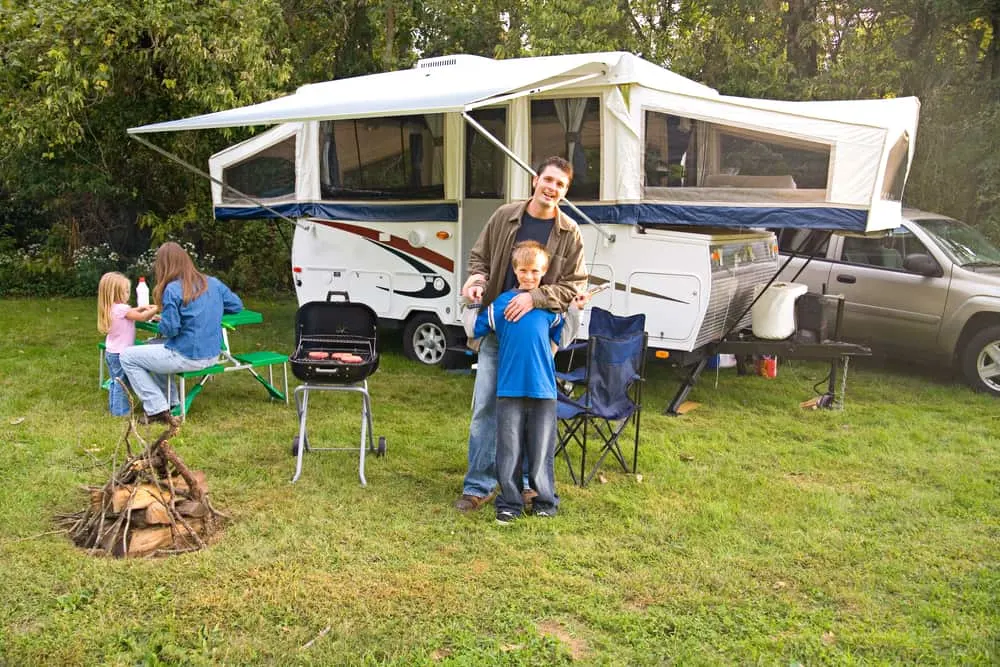
Pop-up campers are almost like a hybrid between a tent and an RV. They combine the sturdy and solid elements of an RV with the more portable elements of a tent.
Pop-up campers are some of the least expensive options for camper travel, starting at less than $10,000 and reaching a peak of around $25,000 for some of the nicer models.
These campers are small and provide all of the basics for camping, including seating, sleeping space, and a small stove for cooking. The bigger models can sleep four or five people, but they’re most comfortable suited for one to three people.
Because pop-up campers are smaller than other options, they don’t come with as many amenities as other camping choices. For example, a few of these campers come with a bathroom, but most do not.
Pop-up campers may be the most beginner-friendly camper option for a couple of reasons. The lower cost is one of those reasons. Another reason is because you don’t have to drive them, and they’re fairly easy to maneuver compared to some larger trailers. They also require less maintenance than some larger camper and RV options.
Travel Trailers
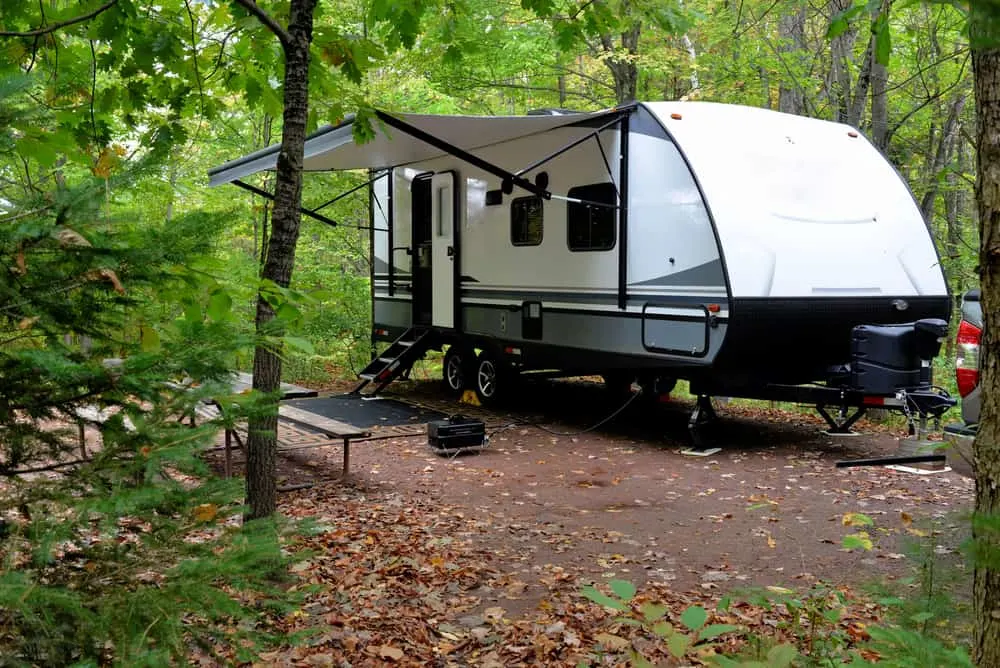
Next up are travel trailers, which are very similar to pop-up campers but bigger and with more amenities. In addition to the seating, stove, and sleeping space, most travel trailers also have full bathrooms and kitchens. The price ranges from $11,000 to $35,000 for a new travel trailer. These trailers hitch to a vehicle, so they require a sturdy vehicle with a good towing capacity.
If you do already have a sturdy towing vehicle, and you have a relatively small family, then a travel trailer can make a great choice. Compared to some larger RV options, a travel trailer can be fairly beginner-friendly.
Fifth-Wheel Campers
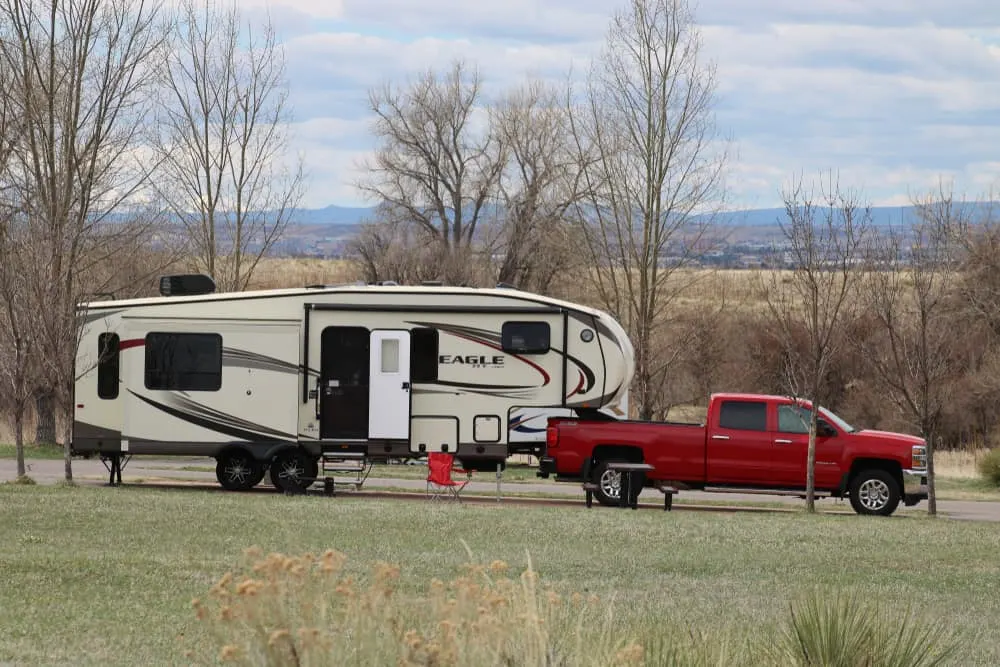
Fifth-wheel campers are so similar to travel trailers that the two are often confused for one another. Fifth-wheels have all of the same amenities as travel trailers, but they also have a few key differences.
One of those differences is the fact that fifth-wheel campers have higher ceilings than standard travel trailers. They also have more space overall, so they may make a good choice for families who want the space of an RV without having to drive an RV.
Fifth-wheels are called fifth-wheels because they require a fifth-wheel hitch to tow them. As a result, they tend to be easier to maneuver than standard travel trailers. However, they can be pricey compared to other camper options, with a price range of $25,000 to $100,000. Keep in mind that if you’re going to buy a fifth-wheel camper, you’ll also have to purchase a fifth-wheel hitch if you don’t already own one.
Motorhomes and RVs
Next, there are motorhomes and RVs. These are drivable vehicles that also provide living space. They come with a bigger price tag than other camping options because they’re bigger and tend to come with more amenities. RVs come in three different classes: A, B, and C.
Class C Motorhomes
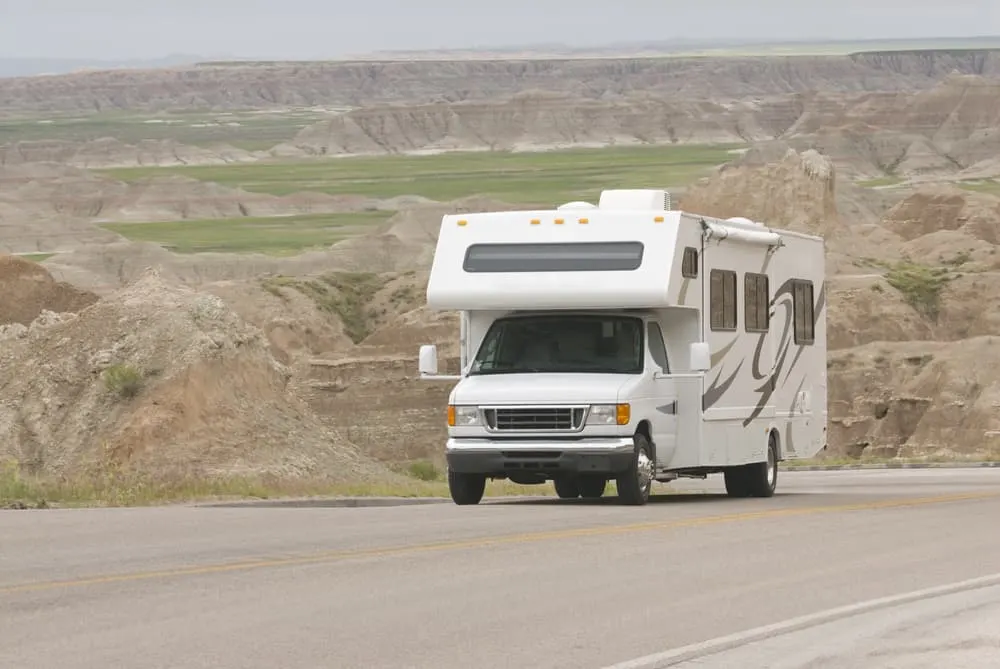
Let’s start with Class C motorhomes. Class C is the mid-range size for drivable motorhomes. On average, a new one can cost anywhere from $50,000 to $100,000, with the possibility of that price going up if you get a larger vehicle with more amenities. Class C motorhomes are similar to moving vans in both size and shape. If you’ve ever rented a small U-Haul truck for a move, then you may find the driving experience similar.
Class B Motorhomes
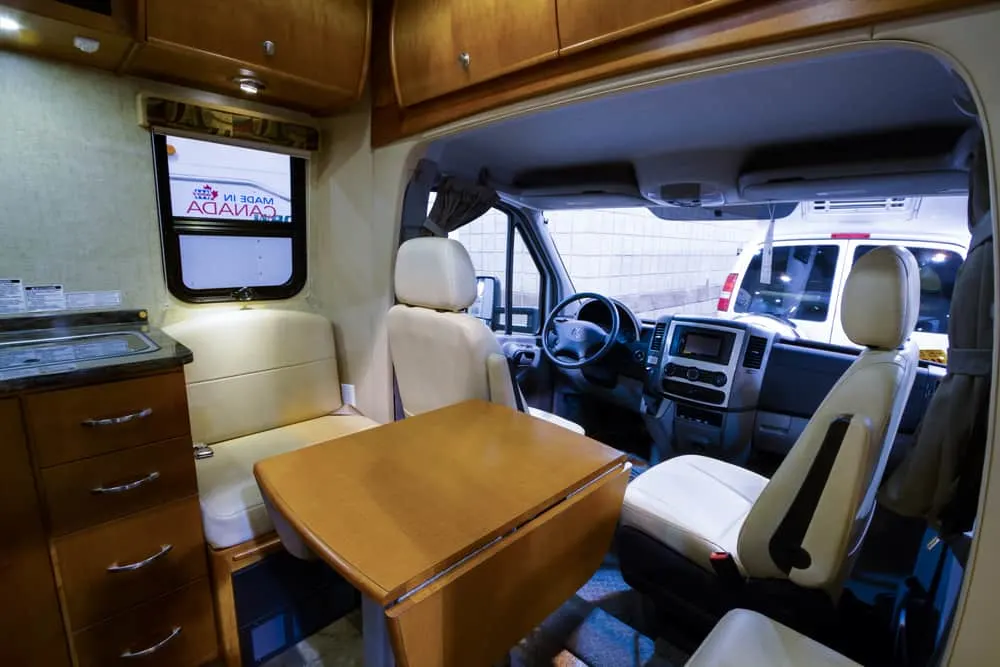
Class B motorhomes are, confusingly, the smallest drivable motorhomes that one can purchase. A lot of people may assume that Class C motorhomes would be the smallest, but that’s just not the case. As the smallest type of motorhome, Class B options may be easier to drive than their larger counterparts. They’re also more fuel-efficient.
Class B motorhomes are essentially a cross between a camper and a minivan. They can cost between $40,000 and $80,000, depending on size and amenities.
Class A Motorhomes
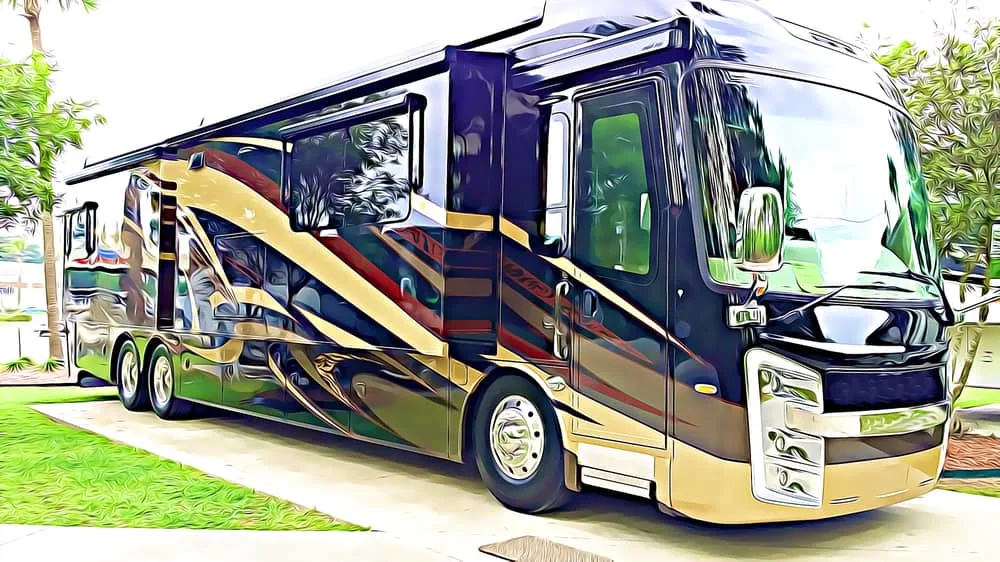
Class A motorhomes are the largest motorhomes that come with the most amenities. The driving experience can be similar to the experience of driving a bus. As such, they require time and practice for people to learn how to drive them.
Though Class A motorhomes can be unwieldy, their large size does bring a lot of benefits. For one thing, many of these RVs are expendable once they’re put in a park, so travelers can enjoy lots of space. In addition to the bed, bunk beds, seating space, and other amenities, Class A RVs can also come with other amenities such as retractable awnings and extra storage space. Many Class A RVs can sleep up to eight people.
Class A motorhomes are the priciest motorhome options, ranging from $50,000 to $300,000 for luxury vehicles.
New vs Used RVs and Motorhomes
Obviously, getting a brand-new RV comes with some perks, which is why a brand-new RV can make the most tempting choice for the aspiring RV owner. For one thing, when you shop new, you’re guaranteed to get one of the latest vehicles on the market, so you can enjoy the most recent bells and whistles. You’ll also get the highest possible market value, and you’ll get a higher resale value should you ever decide to sell your RV. Finally, brand-new RVs come with zero mileage, which can mean fewer problems on the road.
However, used RVs come with perks of their own, and one of those perks is that they cost far less than their newer counterparts. As a matter of fact, you can save thousands to tens of thousands of dollars by shopping used instead of new. Many used RVs on the market are gently used without a lot of wear and tear. Some are even like new.
Other Costs of RV Ownership
Whether you purchase a new RV or a used one, you should also remember all of the additional costs that go into RV ownership. Being an RV owner can get costly, especially if that RV owner doesn’t research the costs ahead of time.
The upfront cost of purchasing your RV is just the first of many costs that you should expect to pay as a motorhome owner. Below are some of the other costs that you should research before you buy your RV.
Maintenance and Upkeep
Think about how much it costs to maintain your car. Your car requires oil changes, washes, and regular maintenance visits to a mechanic. Now imagine doing all of those same maintenance tasks if your car were several times bigger than it is now. Can you picture it? Then you have some idea of what it takes to maintain an RV.
RVs require a lot of upkeep so that they can stay up and running. That upkeep includes all of the things you would expect, plus winterization and de-winterization. Costs can vary by vehicle and location, so do some preliminary research on these costs before you decide to buy an RV.
Parking and Storage
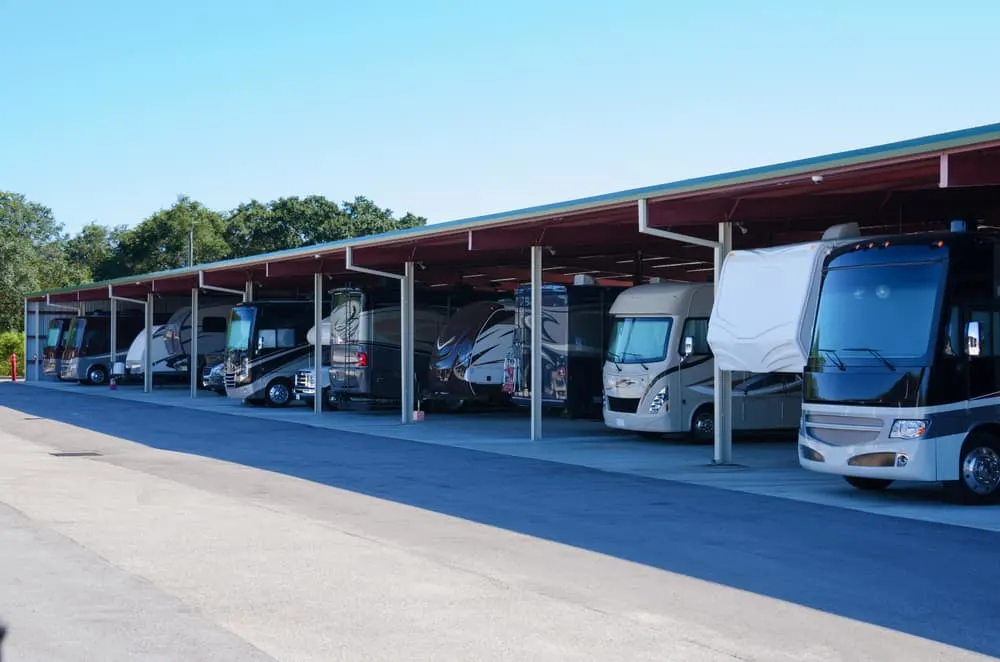
Does your property have space for you to park and store your RV? If so, great! If not, you’ll have to rent space in a specialty garage. Before you buy an RV, look up some garages and storage spaces in your area to get an idea of how much you can expect to pay.
Insurance
RV insurance varies from one state to the next. Some states view RV insurance as a type of car insurance, while others treat RV insurance more like home insurance. The cost of RV insurance can also vary based on the kind of RV you purchase. In any case, insuring an RV is more expensive than insuring a regular car. You can use an RV insurance calculator to figure out how much you can expect to pay for insurance in your state.
Fuel
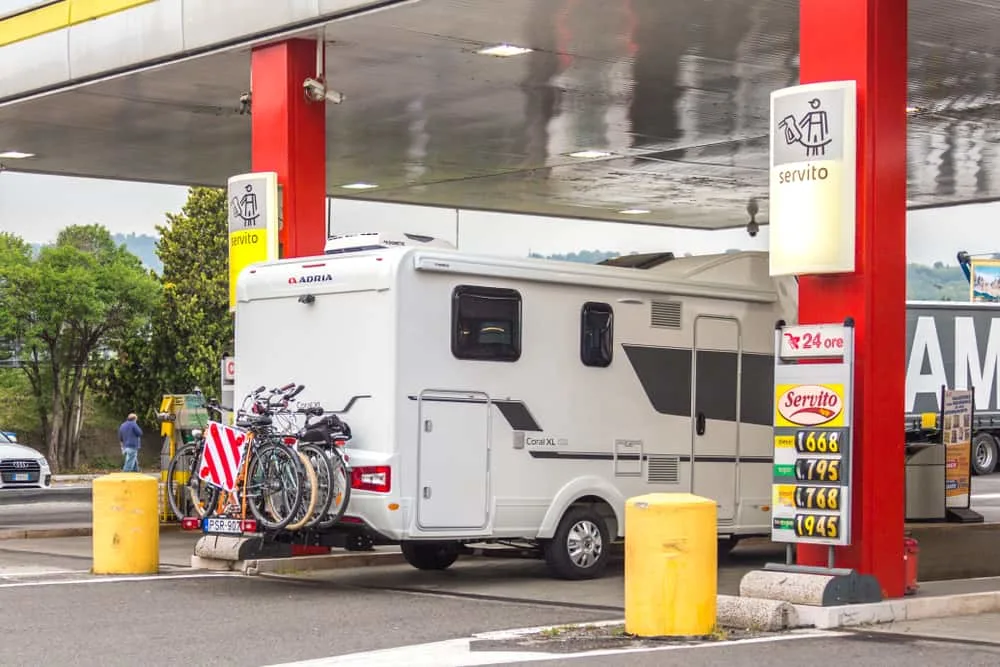
Again, you can save a lot of money while traveling in an RV, since you won’t have to pay for hotels and restaurants. However, there is one aspect of RV travel that will always cost more than car travel, and that’s the fuel. RVs, being much larger than cars and trucks, require a lot more fuel to stay on the road. If you’ve driven with an RV rental before, then you already have some idea of just how much the fuel can cost.
Before you commit to an RV, consider how much money you’re willing and able to pay for fuel. In terms of fuel mileage, Remember that class B motorhomes, being the smallest of the three classes, get better fuel mileage than the other RV classes.
You should also keep in mind that some Class A RVs run on diesel fuel instead of regular fuel, so you should factor that into your costs if you’re considering one of these vehicles. Before you buy a Class A RV, ask the seller what kind of fuel the vehicle requires.
RV Park Usage
Again, staying in an RV is cheaper than staying in a hotel, especially if you have a large family that would require several beds during a hotel stay. That said, staying in an RV park isn’t free. The cost of an RV park stay can vary. It depends on the location, length of stay, and travel season. Some RV parks offer discounts and bundles for longer stays.
Take some time to consider your ideal travel destinations. Then, look up the costs of some RV parks in those areas.
Before You Commit to the RV Lifestyle
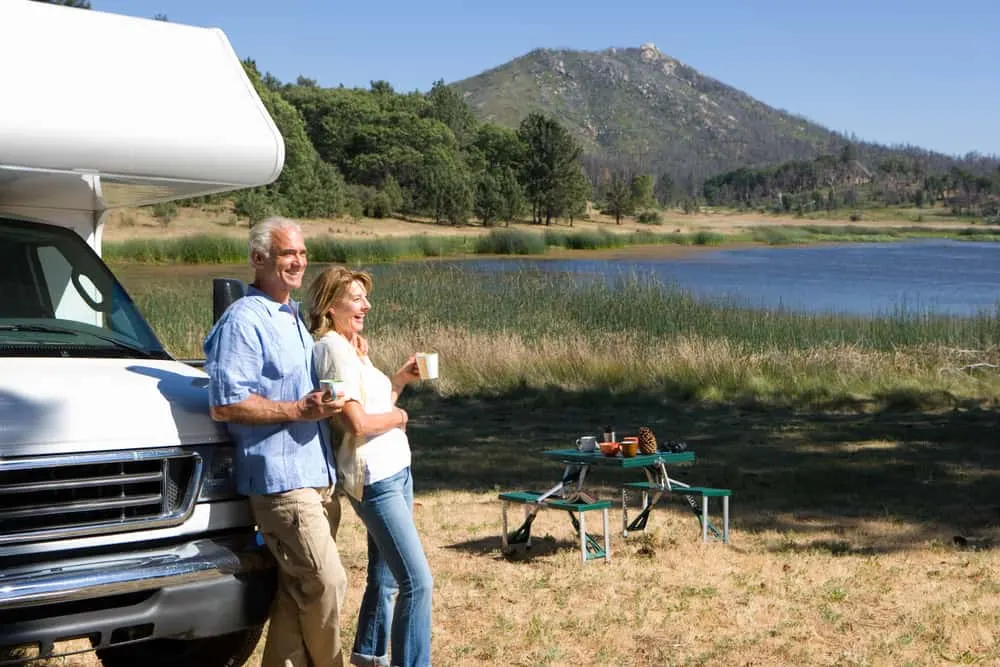
Now that you’ve looked into the costs and benefits of the RV lifestyle, have you decided whether or not it’s the lifestyle for you? Or do you still have questions about whether or not you should buy an RV right now? If you’re new to the world of RVs and motorhomes, one of the best things you can do is get some experience under your belt. This way, you can get a taste of RV living without making an upfront commitment.
A lot of people start out asking “How much does an RV cost?” But as they dig deeper, they find that a lot of other questions come up, like “How hard is it to drive an RV?” and “How much storage space does an RV have?”
The best way to find answers to those questions is to try the RV life for yourself before you commit. One way to do this is through RV rentals. You might find several RV rental options in your area.
If you’ve never camped with an RV before, try going out for a few weekends with a rented motorhome. This way, you can try out different classes and sizes of RV. Once you have a good feel for RV rental camping, you can decide which option will work best for you and your budget.
Aside from RV rentals, another option is RV loans. Do you have a friend or relative who owns an RV? See if they’ll loan you their RV for the weekend. It’s another simple, inexpensive way to see if owning an RV is right for you.
Frequently Asked Questions
Still have questions about RV living and different types of motorhomes? A lot of people do. One of the best ways to answer most of your RV questions is to rent or borrow an RV and try it for yourself. In the meantime, here are some of the most frequently asked questions about RVs and their costs.
